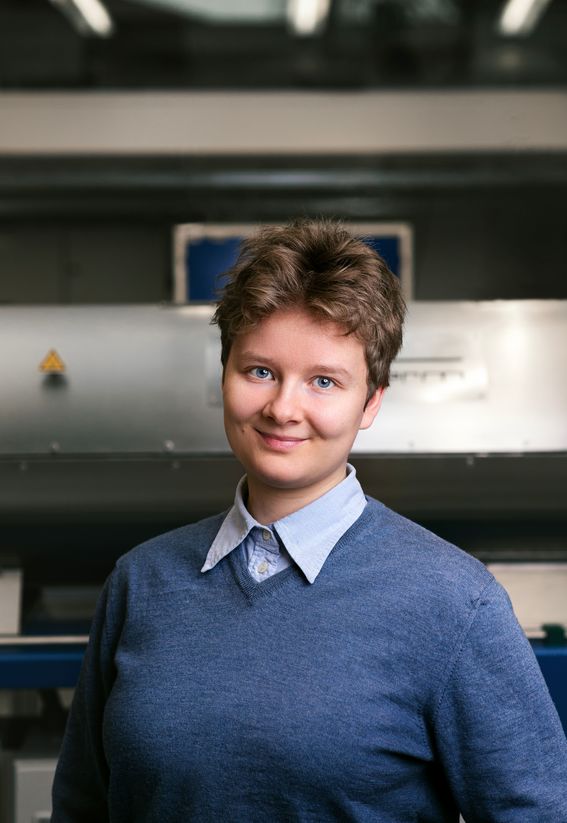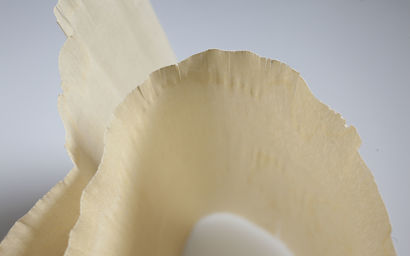Alternatives to fossil-based fibres – Helena Sederholm develops sustainable textiles

Sederholm, a doctoral researcher at Aalto University’s Bioinnovation Center, wants to contribute to a sustainable future.
‘Environmental and climate issues are close to my heart. I want to use my education and learning to solve the obstacles to a better world. There are many problems like this in the textile industry’, says Sederholm.
Originally from Espoo, Sederholm was already interested in natural sciences during her basic education and particularly keen on chemistry and biology. She started studying for a bachelor’s degree at the Aalto University School of Chemical Engineering in 2017.
‘During my studies, materials sciences and, in particular, biomaterials started to attract me. I ended up in the Master’s Degree Programme of Fibre and Polymer Technology, where I was able to familiarise myself with bio-based fibres. It felt right.’
The growing sector needs doctors
In her master’s thesis, Sederholm studied the recyclability of fibres produced with the Ioncell® technology. The thesis indicated that recycled Ioncell fibres are just as suitable for textile production as original cellulose fibres. Sederholm graduated with a Master of Science degree in autumn 2022.
‘In my master's thesis, I got to familiarise myself with the academic world of research. I liked experimental work and enjoyed my time in the research group.’
Postgraduate studies started to interest Sederholm, so she applied for doctoral studies at Aalto University’s Bioinnovation Center, where she was able to start immediately after her master’s studies.
‘Bio-based textiles are still a new field in Finland, but this sector will surely grow. I believe that there will be a need for doctors with expertise and vision related to biomaterials by the time I finish my doctoral studies.’
Using natural phenomena as a model
In her doctoral research, Sederholm develops an environmentally friendly way of producing hydrophobic textiles for outdoor clothing. The hydrophobic properties of today’s outdoor clothing mainly result from synthetic fossil-based fibres. Fossil-free alternatives, on the other hand, contain chemicals that are harmful for the environment.
‘Fortunately, water repellent materials can be found in nature. I try to copy them and apply similar methods in the Ioncell® process. One option is to develop lignocellulosic fibres using lignin derived from wood. In addition to having hydrophobic properties, the fibres used in outdoor clothing must be sufficiently strong.’
The cross-disciplinary CelluMimicry study combines Aalto University’s expertise in chemical technology and business.
‘We are studying how to commercialise bio-based water-repellent materials and how suited they are for mass production. Sustainability and ecology are growing trends that increase responsibility in the consumption of clothing. On the other hand, there are also many challenges involved with the commercialisation of bio-based materials, such as the cost of clothing and dyeing of textiles.’
Sederholm is inspired by the concrete nature of her doctoral research.
‘One day, when my experiments have hopefully been successful, I can hold a piece of fabric in my hand and say: I did it! My research results are not just numbers on the screen or graphs on paper, but material that I can touch and hold.’
Text: Marjukka Puolakka.

Aalto University Bioinnovation Center
To achieve human wellbeing in planetary boundaries, we need new sustainable solutions to wisely use our natural resources. The Bioinnovation Center especially focuses on innovations in sustainable bio-based materials, with special focus on textiles and packaging.
Read more news

The proxy server for remote access to e-resources is changing
If you have problems using e-resources, try accessing the e-resource using VPN connection.
A sustainable city is also age-friendly
Cities must involve older adults more strongly in the planning of the urban environment.
Renate Zhang’s journey in optimising the cost of creation
During the research program at Aalto University, Renate Zhang developed a cost-saving method that inspired her to pursue a doctoral degree.






